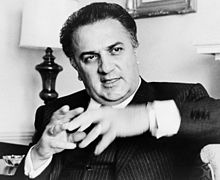Felliniesque
| Federico Fellini | |
|---|---|
 |
|
| Born |
20 January 1920 Rimini, Italy |
| Died | 31 October 1993 (aged 73) Rome, Italy |
| Cause of death | Stroke |
| Occupation | Film director and screenwriter |
| Years active | 1945–1992 |
| Notable work |
|
| Spouse(s) | Giulietta Masina (m. 1943) |
Federico Fellini (Italian: [fedeˈriːko felˈliːni]; 20 January 1920 – 31 October 1993) was an Italian film director and screenwriter. Known for his distinct style that blends fantasy and baroque images with earthiness, he is recognized as one of the most influential filmmakers of all time. His films have ranked, in polls such as Cahiers du cinéma and Sight & Sound, as some of the greatest films of all time. Sight & Sound lists his 1963 film 8½ as the 10th greatest film of all time.
In a career spanning almost fifty years, Fellini won the Palme d'Or for La Dolce Vita, was nominated for twelve Academy Awards, and directed four motion pictures that won Oscars in the category of Best Foreign Language Film. In 1993, he was awarded an honorary Oscar for Lifetime Achievement at the 65th Annual Academy Awards in Los Angeles.
Fellini was born on 20 January 1920, to middle-class parents in Rimini, then a small town on the Adriatic Sea. His father, Urbano Fellini (1894–1956), born to a family of Romagnol peasants and small landholders from Gambettola, moved to Rome in 1915 as a baker apprenticed to the Pantanella pasta factory. His mother, Ida Barbiani (1896–1984), came from a bourgeiois Catholic family of Roman merchants. Despite her family's vehement disapproval, she had eloped with Urbano in 1917 to live at his parents' home in Gambettola. A civil marriage followed in 1918 with the religious ceremony held at Santa Maria Maggiore in Rome a year later.
...
Wikipedia
